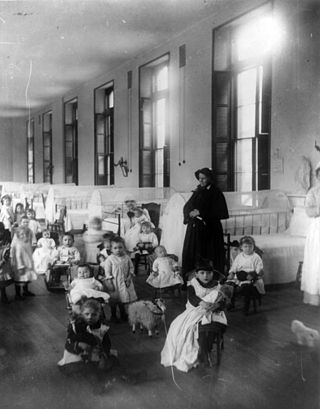Related Research Articles

Adoption is a process whereby a person assumes the parenting of another, usually a child, from that person's biological or legal parent or parents. Legal adoptions permanently transfer all rights and responsibilities, along with filiation, from the biological parents to the adoptive parents.
The international adoption of South Korean children was at first started as a result of a large number of orphaned mixed children from the Korean War after 1953, but later included orphaned Korean children. Religious organizations in the United States, Australia, and many Western European nations slowly developed into the apparatus that sustained international adoption as a socially integrated system. This system, however, is essentially gone as of 2020. The number of children given for adoption is lower than in comparable OECD countries of a similar size, the majority of adoptees are adopted by South Korean families, and the number of international adoptees is at a historical low.
Holt International Children's Services (HICS) is a faith-based humanitarian organization and adoption agency based in Eugene, Oregon, United States, known for international adoption and child welfare. The nonprofit works in thirteen countries, including: Cambodia, China, Colombia, Ethiopia, Haiti, India, Mongolia, Philippines, South Korea, Thailand, Uganda, Vietnam, and the United States. This work includes a range of services for children and families including efforts in nutrition, education, family strengthening, orphan care, foster care, family reunification, and child sponsorship. The organization's stated mission is to seek a world where every child has a loving and secure home.

United States nationality law details the conditions in which a person holds United States nationality. In the United States, nationality is typically obtained through provisions in the U.S. Constitution, various laws, and international agreements. Citizenship is established as a right under the Constitution, not as a privilege, for those born in the United States under its jurisdiction and those who have been "naturalized". While domestic documents often use the words citizenship and nationality interchangeably, nationality is a broader term that refers to national identity and formal membership in a nation, while citizen is reserved to nationals who have the recognized status of citizenship.
International adoption is a type of adoption in which an individual or couple residing in one country becomes the legal and permanent parent(s) of a child who is a national of another country. In general, prospective adoptive parents must meet the legal adoption requirements of their country of residence and those of the country whose nationality the child holds.
Closed adoption is a process by which an infant is adopted by another family, and the record of the biological parent(s) is kept sealed. Often, the biological father is not recorded—even on the original birth certificate. An adoption of an older child who already knows their biological parent(s) cannot be made closed or secret. This used to be the most traditional and popular type of adoption, peaking in the decades of the post-World War II Baby Scoop Era. It still exists today, but it exists alongside the practice of open adoption. The sealed records effectively prevent the adoptee and the biological parents from finding, or even knowing anything about each other. However, the emergence of non-profit organizations and private companies to assist individuals with their sealed records has been effective in helping people who want to connect with biological relatives to do so.

This article concerns the history of British nationality law.
Disruption is ending an adoption. While technically an adoption is disrupted only when it is abandoned by the adopting parent or parents before it is legally completed, in practice the term is used for all adoptions that are ended. It is usually initiated by the parents via a court petition, much like a divorce, to which it is analogous.
In the United States, adoption is the process of creating a legal parent–child relationship between a child and a parent who was not automatically recognized as the child's parent at birth.
Interracial adoption refers to the act of placing a child of one racial or ethnic group with adoptive parents of another racial or ethnic group.
Sealed birth records refers to the practice of sealing the original birth certificate upon adoption or legitimation, often making a copy of the record unavailable except by court order. Upon finalization of the adoption, the original birth certificate is sealed and replaced with an amended birth certificate declaring the adoptee to be the child of his or her adoptive parents, "as if" born to them. Many states, provinces and countries adopted this practice in the early to mid-20th century with the aim of protecting the adopted person from the shame of an illegitimate birth. Sealed or closed birth records are generally associated with closed adoption. Open records is generally referred to as the practice of opening original birth records to adult adoptees, and should not be confused with open adoption, which can occur with or without sealed records, depending on the laws of the state or province in which it is carried out.

The right of abode (ROA) is an immigration status in the United Kingdom that gives a person the unrestricted right to enter and live in the UK. It was introduced by the Immigration Act 1971 which went into effect on 1 January 1973. This status is held by British citizens, certain British subjects, as well as certain Commonwealth citizens with specific connections to the UK before 1983. Since 1983, it is not possible for a person to acquire this status without being a British citizen.

The Child Citizenship Act of 2000 (CCA) is a United States federal law that amended the Immigration and Nationality Act of 1965 regarding acquisition of citizenship by children of US citizens and added protections for individuals who have voted in US elections in the mistaken belief that they were US citizens. The law modified past rules for child citizenship. Under the CCA, certain children born outside the US who did not obtain citizenship at birth may obtain citizenship automatically after admission as permanent residents (CCA § 101) or may be eligible for expeditious naturalization (CCA § 102). The act also implemented protections for some individuals who have voted or claimed to be US citizens as a result of a good faith mistake (CCA § 201).
United States citizenship can be acquired by birthright in two situations: by virtue of the person's birth within United States territory or because one or both of their parents was a U.S. citizen at the time of the person's birth. Birthright citizenship contrasts with citizenship acquired in other ways, for example by naturalization.
Child laundering is a tactic used in illegal or fraudulent international adoptions. It may involve child trafficking and child acquisition through payment, deceit or force. The children may then be held in sham orphanages while formal adoption processes are used to send them to adoptive parents in another country.
Adult adoption is a form of adoption between two or more adults in order to transfer inheritance rights and/or filiation. Adult adoption may be done for various reasons including: to establish interstate inheritance rights; to formalize a step-parent/step-child relationship or a foster parent/foster child relationship; or to restore the original legal relationship between adult adoptees and their biological families.
Deportation of Americans from the United States is the wrongful expulsion, return or extradition of Americans to other countries, often after being convicted of a crime. These individuals in removal proceedings include Americans by birth and legal immigrants that were naturalized under 8 U.S.C. § 1427 or admitted as nationals of the United States under the Child Citizenship Act of 2000. A U.S. citizen cannot legally be deported, and thus can return to the United States at any time.

Blue Bayou is a 2021 American drama film written and directed by Justin Chon. The film stars Chon, Alicia Vikander, Mark O'Brien, Linh Dan Pham, Sydney Kowalske, Vondie Curtis-Hall and Emory Cohen.
Same-sex adult adoption involves adult adoption—the adoption of one adult by another—of a partner in order to benefit in some way, such as to create family relationships, to ensure inheritance rights and to keep collateral relatives from contesting the estate plan of the adopted adult. It was most prevalent from the 1970s and 1980s to early 2000s, as during that time, many countries had not legalised same-sex marriage. It was mostly used due to same-sex marriage not being available in some countries, to create a family unit, get property and inheritance rights, securing insurance benefits and allowing recovery in tort. Same-sex adult adoption has evolved during the years, becoming less prevalent in countries where same-sex marriage is legal. It is not to be confused with LGBT adoption, wherein another party is adopted by a couple.

Bernice Gottlieb is an early leader in the trans-racial adoption movement in the United States. In later years, she led a residential real estate firm and authored several books, including one on adoption.
References
- ↑ POV (2000-01-17). "Adoption History | First Person Plural | POV | PBS". POV | American Documentary Inc. Retrieved 2024-05-03.
- 1 2 Choe, Sang-Hun (2 July 2017). "Deportation a 'Death Sentence' to Adoptees After a Lifetime in the U.S." New York Times.
- 1 2 Bergquist, Kathleen Ja Sook (Fall 2007). "Right to Define Family: Equality under Immigration Law for U.S. Inter-Country Adoptees". Georgetown Immigration Journal. 22: 1–20 – via HeinOnline.
- 1 2 Martin-Montgomery, A., Cappelli, K., Demitrack, L., Kunz, D.B., Lyford, C.J., Mullen, M., Perschied, M., Sharkey, C., Spector, A. (2018). “US Adoptees Without Citizenship National and State-by-State Estimates." Adoptee Rights Campaign.
- ↑ "ADOPTEES FOR JUSTICEAdoptees For Justice". ADOPTEES FOR JUSTICE. Retrieved 2019-06-10.
- ↑ Pampanin, Mark (July 3, 2018). "Los Angeles City Council Resolution". Adoptee Rights Campaign. Retrieved June 11, 2019.
- ↑ Gammage, Jeff (2 June 2017). "Adopted from Korea as a child, deported as an adult — Philly man takes his life". Philadelphia Inquirer.
- ↑ Ahn, Young-joon (Jan 29, 2019). "Adoptee deported by U.S. to sue South Korea, adoption agency". Associated Press. Retrieved June 10, 2019.
- ↑ "South Korean court orders agency to compensate adoptee over his mishandled adoption to US". Associated Press News . 16 May 2023.
- ↑ Adler, Eric (20 December 2019). "'The end is coming' — A retired Army officer's adopted daughter prepares for deportation". Kansas City Star.
- ↑ Bacon, John (3 October 2018). "Time, options running out for Kansas family fighting deportation of adopted S. Korean child". USA Today.
- ↑ "With Cannes Darling 'Blue Bayou,' Justin Chon Asks What It Means to Be an American". GQ. 2021-09-16. Retrieved 2021-09-17.
- ↑ Bae, Hannah (16 September 2021). "In Justin Chon's 'Blue Bayou,' one man's fictional immigration saga raises real-world political awareness". Datebook | San Francisco Arts & Entertainment Guide. Retrieved 2021-09-19.